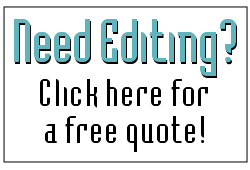 In the late ’80s, I landed my first job out of college at a PR firm in Seattle. I wrote press releases and sponsorship proposals, and I was responsible for proofing all copy—posters, brochures, and promotional material.
In the late ’80s, I landed my first job out of college at a PR firm in Seattle. I wrote press releases and sponsorship proposals, and I was responsible for proofing all copy—posters, brochures, and promotional material.
From there, I moved into technical editing. I was working in document control for an engineering company, putting together huge reports and studies for clients, when a coworker—a technical writer and an ex-newspaper editor—realized I had a knack for good copy and quickly became my mentor. He taught me proofreading skills, quizzed me constantly on tricky grammatical issues and issues of style, and eventually started dumping half his workload on my desk. And I relished every moment of it.
Eventually I decided to go freelance, but I wanted to work in fiction. I spent years reading writers’ forums and writer-related websites, and I surfed the Internet ad nauseam to learn more about the industry. I studied the Chicago Manual of Style, countless grammar reference books, and the Writer’s Market obsessively, slowly building up a client list and honing my skills.
Today, I consider myself extremely fortunate to do what I love best—reading terrific manuscripts, and helping writers improve their craft and increase their odds of publication.
It’s imperative to have a true and profound love for the written word in order to succeed in this business, and it helps to be a lifelong, voracious reader. You need to have a solid grasp of the rules of writing and combine that with an instinct for what reads well. You don’t want to work at a snail’s pace, agonizing over the smallest decisions, and you must be confident in order to stand behind your suggestions and changes.
As a freelancer, my clients are my number one priority. A writer’s work is extremely personal, so I take my responsibility seriously, from meeting deadlines to maintaining good communication and respectfully offering suggestions for improvement, and I stay current on the trends in the publishing industry itself. I have a sincere desire to help writers get their work published, and with my reputation on the line, I want their work to be in the best possible shape it can be—technically and stylistically. Drop me a line using my contact form if you’re a writer who could use a little help too!

